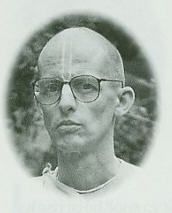AT A BACK TO GODHEAD editorial meeting in the mid 1980s, we discussed a letter from a reader criticizing us for not being relevant. Why, if we claimed that Krsna consciousness could solve real problems crime, war, famine were we keeping those solutions to ourselves? Why weren't we making our magazine the cutting edge of spiritual journalism?

As we discussed the criticism, we began to feel we needed to revolutionize Back to Godhead.
Suddenly, one of our staff members said, "Wait, it doesn't sound Krsna conscious to place so much emphasis on this world. Our philosophy is otherworldly."
Otherworldly? That sounded unattractive. But he was right. Srila Prabhupada did not teach us to make ourselves at home in this world, or even to worry too much about fixing it. He taught us to focus on the spiritual world. The material world cannot be fixed; it's supposed to be miserable.
"Otherworldly" has several meanings. My dictionary defines it first in a neutral way: "relating to the spiritual or imaginary world." We live in the material world but fix our minds on another world, spiritual or imaginary. The second definition is less neutral: "impractical, unworldly." An otherworldly person has no concern for material values or pursuits; he or she lacks sophistication, is perhaps naive.
In the Krsna conscious sense, "otherworldly" means we aspire to transfer to the spiritual world when we leave the body and we learn to live in that aspiration while in the material world. Our editorial staff decided BTG would be relevant by focusing on this unique attempt to become otherworldly.
Three basic ways to become otherworldly in the Krsna conscious sense are to hear about the spiritual world, to practice detachment from this world, and to gradually learn to live heart and soul in the spiritual world even while residing in this one.
Hearing about the spiritual world is important because it develops our desire to go there. Srila Prabhupada makes a similar statement in his Bhagavad-gita commentary. After Krsna presents a few details about the spiritual world, Srila Prabhupada writes, "One should be captivated by this information. He should desire to transfer himself to that eternal world and extricate himself from this false reflection of reality." (Bg. 15.6) If not captivated by information of the spiritual world, we will remain captivated by what we hope to achieve in this one.
The Vedic literature is unique in that it gives so much information about the spiritual world. The more we hear from the Vedas about the spiritual world, the more attracted to it we can become, and the more otherworldly. Then we have to cultivate detachment from this world. The scriptures point out, and our experience confirms, that this world is a place of suffering. We should want to leave it. Human life is short. The attachments we have spent our life cultivating will determine what happens at the end of this life, whether we will return to the miserable world or transfer to the spiritual one.
This is what Srila Prabhupada taught. He himself was a perfect blend of down-to-earth and otherworldly. People to whom Prabhupada spoke often tried to bring him down to what they considered a more relevant position. He seemed to speak only the ideal. But Prabhupada wouldn't budge. He argued for the ultimate reality of the spiritual world and crashed through worldly arguments. Did they think they could help the poor? How? Did they think their peace talks would amount to anything practical? They were fools to think so. The real solution and he asserted it again and again was to chant Hare Krsna.
Yet he was no dreamer. He lived in a spiritual reality as tangible to him as our world is to us. He spoke from experience. He never taught us to hate this world, but to create love for the next. He taught us to live in the here and now, but in Krsna consciousness. That requires seeing Krsna in this world and doing everything to attain our otherworldly goal. Prabhupada didn't teach cold detachment, but a life of love of God.
Yes, this world is temporary, but it comes from Krsna. Yes, we should renounce it, but we should do so by using it completely in His service. Don't form attachments here. Let worldliness grow into otherworldliness; don't live a secular, spiritually forgetful life. Live with ultimate reality.
Satsvarupa Dasa Goswami is the author of many books, including a six-volume biography of Srila Prabhupada.
